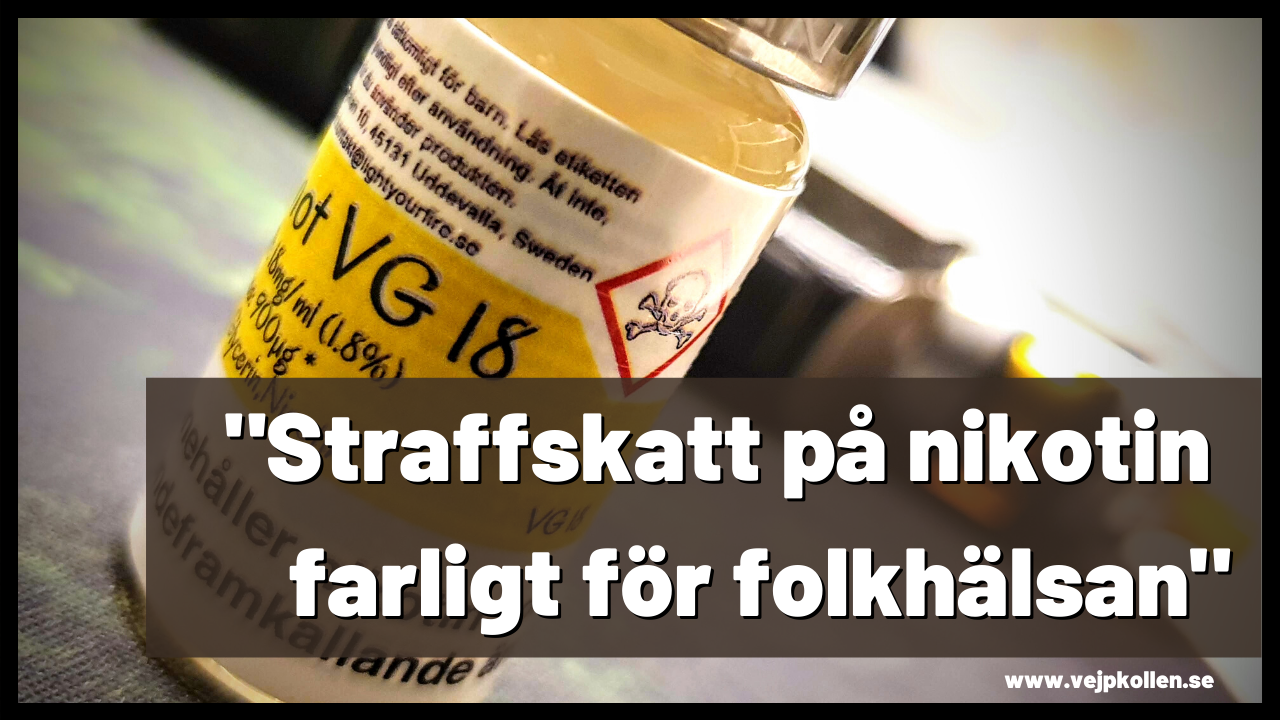Nicotine cones above 15 mg/ml will cost three times as much from next year. With a nicotine tax of €4,000 per liter, the government hopes for more revenue. And better public health.
"More smokers will stay in their tobacco use. That is not public health. It's criminal," says Christian Brandt, who runs Light Your Fire (LYF).
The Ministry of Finance wants to shock the price of so-called highly concentrated nicotine liquid. The Ministry proposes an excise duty of SEK 4000 per liter. This means that the price of a nicotine shot, with 15 mg/ml or more, will increase by almost 70%. If the proposal goes through, the tax will apply from 2021.
The proposal is based, among other things, on a miscalculation of the market for the previous taxation of nicotine e-liquids in 2018. The idea was then to introduce a excise duty on all nicotine-containing e-liquid. The tax was calculated per liter and was the same regardless of nicotine strength: SEK 2000 per liter.
Adapting e-juice to nicotine tax
But at the same time as the tax was introduced, Swedish companies adapted their ranges to the newly introduced EU directives (TPD). Under the new laws, companies were not allowed to sell nicotine-containing e-liquid in bottles larger than 10 ml and taxes on nicotine-flavored e-juice became mandatory. However, instead of paying fees and taxes, most companies in the industry chose to adopt a new system to sell e-juice: nicotine-free and flavored shortfills (unregulated) with room for nicotine shots.
Sales of taxed nicotine liquids have therefore decreased significantly since 2018.
No tax on nicotine pouches
The next setback for taxation came in 2019. It became clear that the tax authorities were not actually entitled to tax nicotine liquids with a concentration higher than 16 mg/ml. The reason was the Swedish chemicals legislation, which classifies liquids with a concentration higher than 16 mg/ml as "acutely toxic". This meant that the most common variant of nicotine cones could be sold without a tax surcharge.
Overall, nicotine cones are therefore much cheaper for the consumer than, for example, a pre-mixed e-juice with 16 mg nicotine strength, largely due to the tax.
Missed 34 million in tax revenue
Tax revenues from e-juice sales were much lower than expected. The Ministry expected 78 million but only received 44 million. This was 34 million less, writes the Ministry in its memorandum.
Now they want to address this by introducing a new category in tobacco legislation: highly concentrated nicotine liquids (15-20 mg/ml). These will be taxed at twice the rate of other e-liquids, at SEK 4,000 per liter. In this way, the Ministry expects to raise an additional 46 million.
"Make the same mistake again"
But this version of the nicotine tax will not lead to higher tax revenues this time either. At least that's what Christian Brandtwho has worked for a long time with e-cigarettes and e-juice production in Sweden. Since 2011, he has run the family business Light Your Fire, with shops in Uddevalla and Gothenburg.
"To think that tax money will be made from this is completely wrong. The industry will adapt to lower nicotine levels. They will adapt to nicotine below 15 mg in strength to avoid the tax increase. It will be the same as last time" says Christian Brandt.
E-cigarettes are a popular way to quit smoking. And according to studies the most effective. But according to Christian Brandt, the sharp increase in tax will affect the large group of people who use e-cigarettes to smoke. The price is crucial, he says. Many of his customers reacted negatively to the first excise duty.
"Customers started doing the math and many felt that using e-cigs was becoming as expensive as smoking. So they simply started using tobacco again" says Christian Brandt
Nicotine tax leads to more smokers
According to the Ministry of Finance's own analysis, there are currently 82,000 daily users of e-cigarettes in Sweden. And about 165,000 occasional users. To further justify the tax increase, the Ministry of Finance also points to the health effects of nicotine. By taxing the highly concentrated e-liquid higher, sales will probably decrease. And that promotes public health, the ministry writes.
Christian Brandt, on the other hand, thinks that the Ministry misses the whole point of vejpning. And that a tax is more likely to lead to poorer public health, as smoking increases instead.
"Penalizing an industry in this way is not only wrong. It will also have a huge impact on the deterioration of public health. More smokers will remain in their cigarette habit. It is clear that this is all about money. It is almost a criminal act" says Christian Brandt.
The consultation period for the new tax proposal ends on May 2. Until then, several bodies have the opportunity to comment on the proposal. Electronic Cigarette Industry Association is currently preparing its official response.
You can read the full The Ministry of Finance memorandum here.




